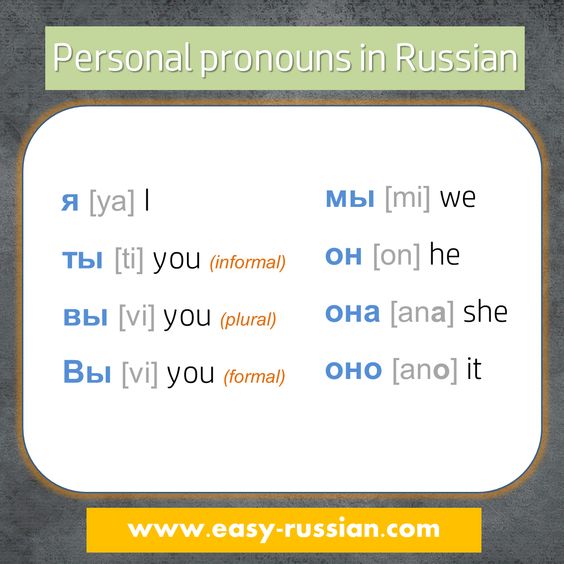Personal Pronouns in Russian (я, мы, ты, вы, etc.)
Personal pronouns are basic words you should know in any language. It’s almost impossible to avoid them in speaking. So, in this lesson we will learn the personal pronouns in Russian.

If we put personal pronouns in the table for better understanding, they will look like this:
| SINGULAR | PLURAL |
| я [ya] – I | мы [mih] – we |
| ты [tih] – you (informal) | вы [vih] – you (formal/plural) |
| он [on]- he | они [ah-ni’] – they |
| она [ah-na’] – she | |
| оно [ah-no’] – it |
We use вы not only when adressing more than one person, but also when we’re talking to a person we don’t know. Plus, there are many situations when we use вы to show that we respect a person we’re talking to. For example, it can be an old lady living next door or a professor at the university where you’re studying.
The rest of the prepositions are quite easy to understand. If you want to study the pronunciation of these words, watch my video. It also has an exercise part where you can test yourself.
Remembering all these words is not hard. The problem is that you have to place every pronoun into the correct case, and, believe me, it’s very hard. Every word changes in every of six cases (!).
Looks very frustrating, right? You need to remember all these cases. Notice that we use the same forms of pronouns in the genitive and the accusative case. Well, at least this fact makes remembering a little easier.
But you will probably ask a question: “How and when should I use all these forms?”. Keeping all these words in memory doesn’t mean you can find the right time to use them. So we have to study some examples in a context.
Read Also: Possessive Pronouns in Russian and Their Forms
Personal pronouns in the nominative case are allways subjects in the sentence.
Genitive case:
У меня есть собака. – I have a dog.
Accusative case:
Я видел её вчера. – I saw her yesterday.
Мой дядя попросил меня купить ему яблок. – My uncle asked me to buy him some apples.
Dative case:
Дай мне вон ту книгу. – Give me that book.
Я покажу тебе фотографии. – I will show you the pictures.
Instrumental case:
Этот стул сделан им. – This chair was made by him.
Я не пойду в кино с тобой. – I won’t go to the cinema with you.
Prepositional case:
Давай поговорим о нас. – Let’s talk about us.
Unfortunatelly, there are some other forms of personal pronouns in Russian. I know, you are already sick of them, but don’t give up. Let’s see how some pronouns change their forms.
ими –> ними
Мы пойдем туда с ними. – We go there with them.
её –> неё
У неё пять детей. – She has five children.
им –> ним ей –> ней
Я поговорю с ним (с ней). – I will talk to her (to him).
Have a question? Leave a comment, don’t be shy. I’ll help you as soon as possible.
